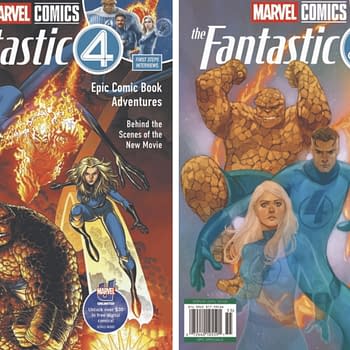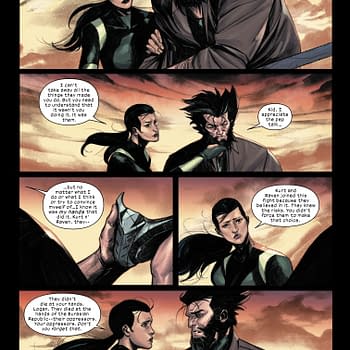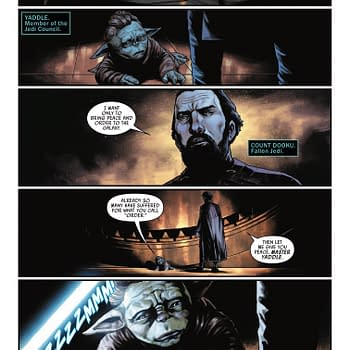Posted in: Comics | Tagged: Batman & Robin, dc, graphic novel, image, marvel, numbercrunching, tpb, trade paperback, ultimate spider-man
Jack Of All Trades by Dave Wallace – Numbercrunching Batman, Spider-Man And The Walking Dead
Welcome to back to Jack of All Trades, the comics column that has no truck with invertebrates (yes, everything I cover has to have a spine). This week, I plan to look in a little more detail at one of the major factors that influences our decision to tradewait books rather than buy monthly issues as they come out: cold, hard cash. I want to examine the economics of tradewaiting — and via a few examples, try to work out whether we're really saving as much money by tradewaiting as we think.
To do this, I'm going to pick a handful of the highest-profile runs in recent years from DC, Image and Marvel, and look at how much it would cost to buy a significant chunk of these runs in different formats. Although this is hardly a scientific process, it should give us a good idea of how various formats compare, and how much we stand to save by tradewaiting.
My only criteria are that the run should comprise individual ongoing comics that came out on a monthly basis but are also readily available in trade, and should cover books that are available in a number of formats, for comparative purposes.
The length of each run is selected on the basis of what the largest single collected edition comprises, and all prices are based on cover prices. I'll list the different formats in order of release, so you can see whether there's any correlation between waiting longer and getting a better deal.
We'll start with DC.
Batman & Robin #1-16, plus Batman: The Return
Grant Morrison's Batman & Robin was something that I looked forward to reading each time a new issue came out. Because I liked it so much — and enjoyed joining others in speculating about it online as the new issues came out — I don't know if I would have had the restraint to tradewait it. But how much would I have saved if I did?
Original issues: 15 x $2.99 + $3.99 + $4.99 = $53.83
Hardcovers: $24.99 + $24.99 + $24.99 = $74.97
Softcovers: $14.99 + $17.99 + $17.99 = $50.97
Absolute Edition: $99.99
Interesting results. The only way in which you'd have saved money by tradewaiting this series is if you'd have waited for the regular TPBs rather than the hardcovers — and due to the notorious slowness of DC's trades programme, you'd still be waiting for the final volume to come out if you did!
The hardcover editions would, somewhat surprisingly, cost you about half as much again when compared to the single issues. And the upcoming Absolute edition would cost you almost double (but then you'd be paying for some lovely production values on that).
On to Image.
The Walking Dead #1-48
Robert Kirkman's The Walking Dead is a series that really found an audience in trade. Putting aside the fact that the first issue sells for ridiculously inflated amounts of cash these days, how much would you have saved by waiting for the trades on this one?
Original issues: 19 x $2.95 + 29 x $2.99 = $142.76
Softcovers: $9.99 + 7 x $14.99 = $114.92
Hardcovers: 4 x $34.99 = $139.96
Omnibus editions: 2 x $100 = $200
Compendium: $59.99
Looks like this comparison throws up quite different results to Batman & Robin. You'd actually spend marginally less if you'd tradewaited this series in hardcover, whilst you'd have spend substantially less by collecting the softcover trades. In fact, the only way in which tradewaiters would spend more on this series than floppy enthusiasts is by buying it in the deluxe oversized omnibus format.
If nothing else, this comparison should show you what insanely good value that compendium edition is (and having bought a copy myself, I can tell you that the production values are actually pretty decent, despite the budget price — although you don't get the series' covers, which is a shame). A huge chunk of one of the most successful comics of recent years for less than half cover price is what they call a no-brainer, and demonstrates the kind of advantage that tradewaiters can reap from extreme patience.
Finally, let's take a look at my Marvel pick.
Ultimate Spider-Man #1-39
Brian Bendis's original run on Ultimate Spider-Man is well-known for being one of Marvel's big successes in bookshops. But how much of a saving did tradewaiters make over those who bought the original issues?
Original issues: $2.99 + 3 x $2.40 + 35 x $2.25 = $88.94
Softcovers: $19.99 + $24.50 + $17.95 + $14.99 + $11.99 + $15.99 = $97.41
Oversized hardcovers: 3 x $29.99 = $89.97
Ultimate Collection TPBs: $24.99 + 2 x $29.99 = $84.97
Omnibus Edition: $99.99
Despite inflationary concerns — due to the fact that these various collections were released so far apart (the Ultimate Collection TPBs only started coming out in 2007, seven years after the series started being published) — it looks as though the only way to get this series cheaper than the cover price of the single issues would have been to wait for those seven years and bag the Ultimate Collection TPBs. Even then, you'd only have saved around four dollars, so there's not exactly much of a financial incentive for tradewaiters there.
Having examined these few examples, I'm starting to wonder whether the economic rationale for tradewaiting is as sound as many people seem to assume. It seems as though there's a lot of variation in the financial reward offered by tradewaiting, depending on which publisher is responsible for the collected editions, what formats are offered, and what kind of pricing model they use (all of which are often difficult to predict before collections are solicited — see DC's apparently random selection of formats for the various "new 52" collections).
Yes, you can make the argument that it's possible to buy trades at substantial discounts from online retailers. However, it's just as possible to get similar discounts off the prices of single issues if you buy from the right place — so the economics of tradewaiting aren't as simple as taking account of the 'amazon factor' to generate your savings.
Given the apparent uncertainty of the financial rewards of tradewaiting, it's perhaps more important to give weight to the other reasons why readers might choose not to follow monthlies: the sturdiness of collected editions, the lack of ads, and the ease of storage are all considerations. For these reasons and more, I'll always favour TPBs and Hcs over floppies where possible — although as I indicated earlier, there are definitely times when I miss the immediacy and up-to-dateness of following books as they come out.
Perhaps the ideal solution would be a hybrid model along the lines of Halo 8's plans for its Godkiller franchise, whereby a reader receives monthly digital versions of the single issues (in .pdf or .cbr format, no less) and then a hardcopy of the collected edition, all for a single price. But I wonder whether the bigger publishers would be willing to offer such a beneficial deal to readers — and whether readers would be confident enough to commit their cash to buying several issues sight unseen?
Anyway, I've probably written enough about this issue for the time being. What do you think? Do the economic benefits of tradewaiting outweigh the drawbacks? Is money the deciding factor when it comes to choosing whether to buy single issues now or wait until later? Let me know your thoughts in the thread below. And if anyone fancies putting together their own tradewaiting cost comparisons for other titles, be my guest.
Batman Year One: Deluxe Edition: It's not very often that I'll feature a preview expressly recommending that people don't buy a certain book, but given the recent comments of artist David Mazzucchelli about how badly DC have messed up this latest "deluxe edition" of his and Frank Miller's Batman masterpiece, I can only urge people to heed the man's advice and steer well clear. It looks like we need to either wait for a new edition that addresses these missteps, or try and snag a copy of the last deluxe hardcover edition that DC put out. For now, I'm certainly happy enough with my original TPB edition that I don't feel the need to rush into 'upgrading' to an inferior product.
X-Men Season One: Has anyone been reading these "season one" books from Marvel? Personally, I can't help but feel they're not aimed at regular comics fans, but are instead targeted at a casual bookstore audience who want a clear entry point for the publisher's biggest franchises. But I'd be interested to get some feedback from anyone who has read any of the earlier volumes. Do they have anything to offer the more informed fan, or are they more of an entry-level recap-of-the-basics type affair?
Womanthology Heroic HC: Here's what the cover copy for this fifty-dollar book — being published by IDW — has to say about it:

This sounds like a pretty interesting project to me. Although the mention of "women of all experience levels" sounds like it could mask an amateurish, low-quality approach, the book actually features some of the biggest female names in the industry (including Ann Nocenti, Gail Simone, Coleen Doran, Fiona Staples, and many more). And the idea of an all-female showcase is pretty timely, given the current interest in gender equality among comics creators.
As with all anthologies, I'm sure there will be a certain hit-and-miss quality to Womanthology, but for those who want to support female comics creators, you could probably do a lot worse than check this out. And the fact that some of the proceeds of the book will go to charity doesn't hurt.

But forget superheroes: this is where American comics really started to get interesting. After all, anything that can give Dr. Fredric Wertham nightmares has got to be good for the soul.
Review:
Parker: The Martini Edition
I recently did something that I wouldn't usually do, and took a chance on buying a story I'd never read in its more expensive deluxe format, purely because I'd heard such good things about it. That series was Darwyn Cooke's comics adaptations of Richard Stark's "Parker" novels, all of which (so far) are collected in a single juicy package: the "Martini Edition", which also includes loads of extra material, printed in a slipcased hardcover that's even larger than DC's Absolute editions (just slightly). The book's introduction raves about how editor Scott Dunbier — who also spearheaded the Absolute format — wanted to give this book the best treatment possible, and it's certainly a great-looking package. Cooke's deceptively simple art — rendered in monochrome pen-and-ink and then overlayed with a single colour ink wash (usually blue or orange) — feels incredibly faithfully-reproduced in the larger format, to the extent that you can even still see faint construction lines here and there, and sense the minor variations in the inkwash that give the panels their depth and texture. However, despite looking so good, I'll admit that, when I was about halfway into the first book collected here ("The Hunter"), I started to worry a little that the material didn't justify the luxurious treatment. That's possibly because the first book is such a straightforward story, told in a straightforward way, that it doesn't immediately stand out as being incredibly special (despite

To Be Continued…
Next time, in honour of the (apparently) imminent release of the long-awaited Flex Mentallo hardcover, I'm going to run a special edition of Jack of all Trades, picking out the best Grant Morrison and Frank Quitely collections available — as well as highlighting some of their lost gems that have never made it into a collected editions. So if you have any particular favourites that you think should be spotlighted, post 'em below!
















